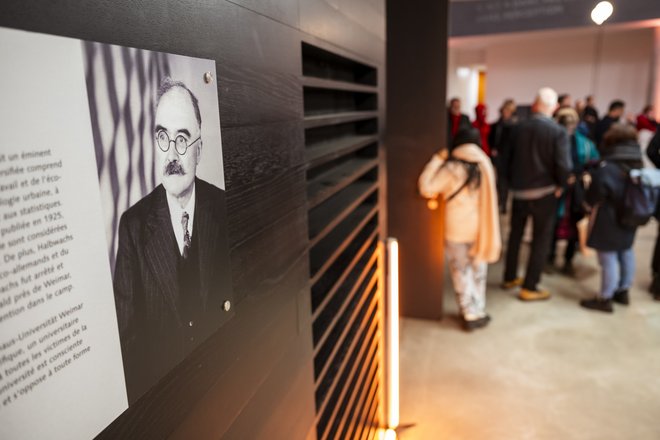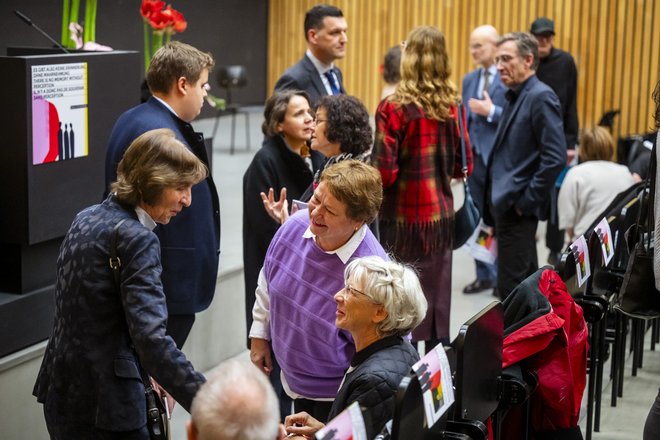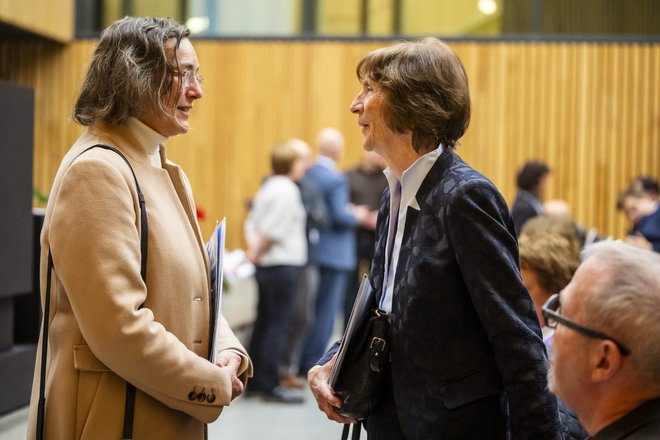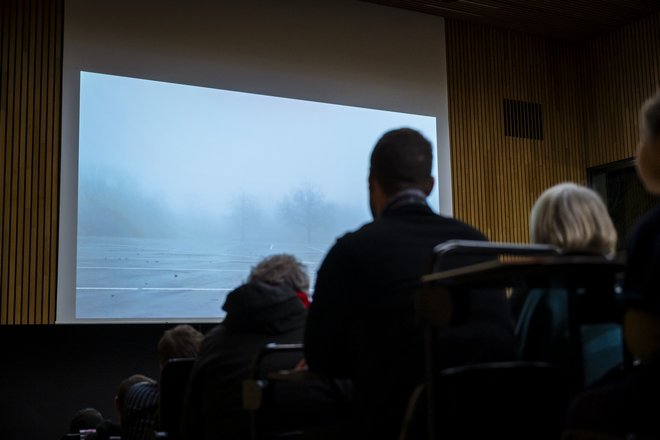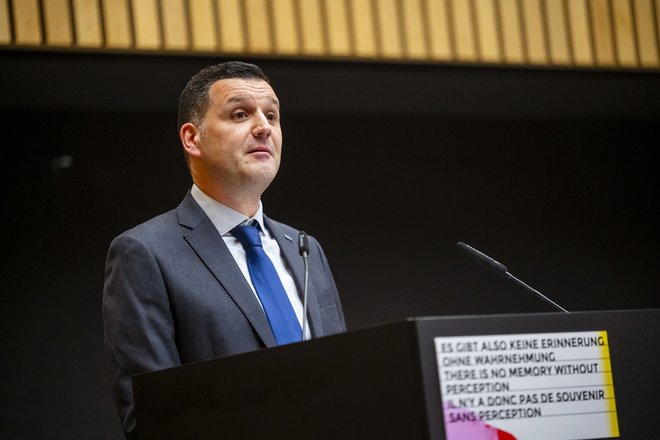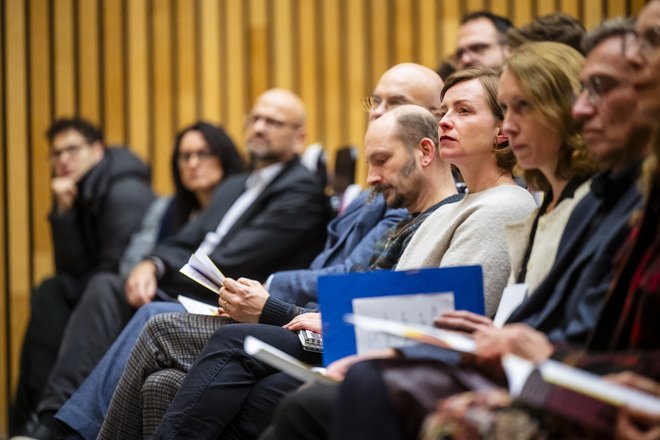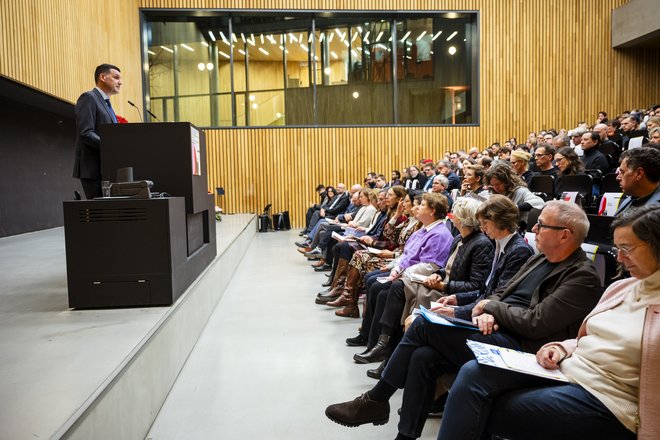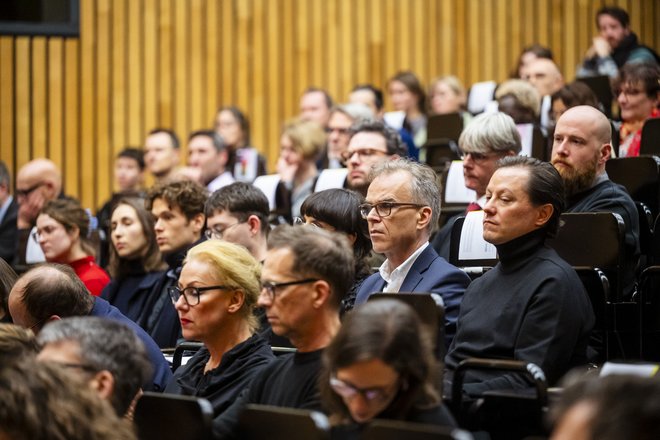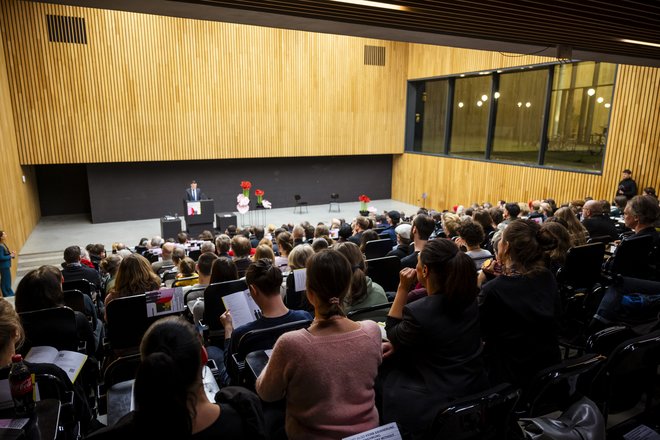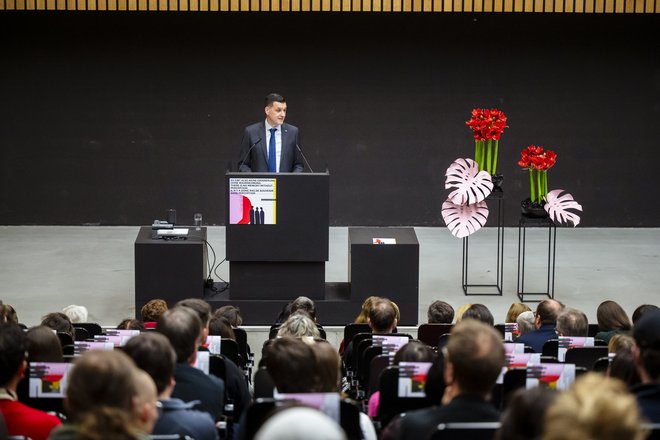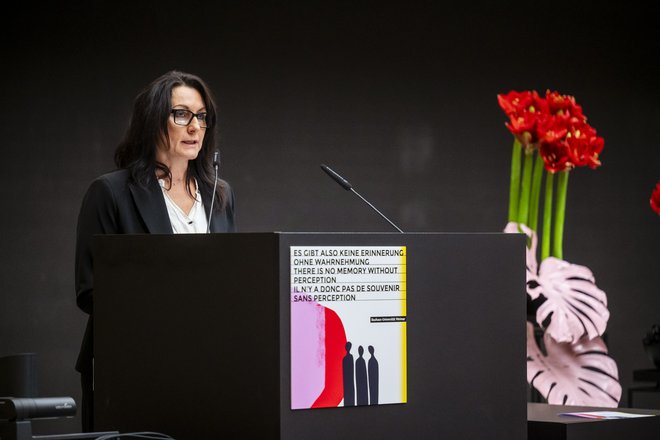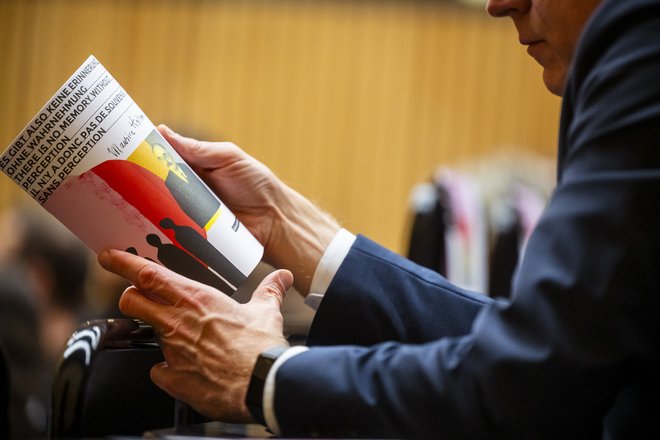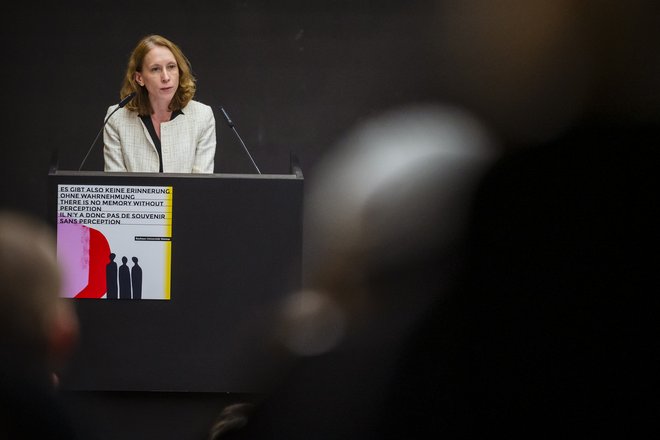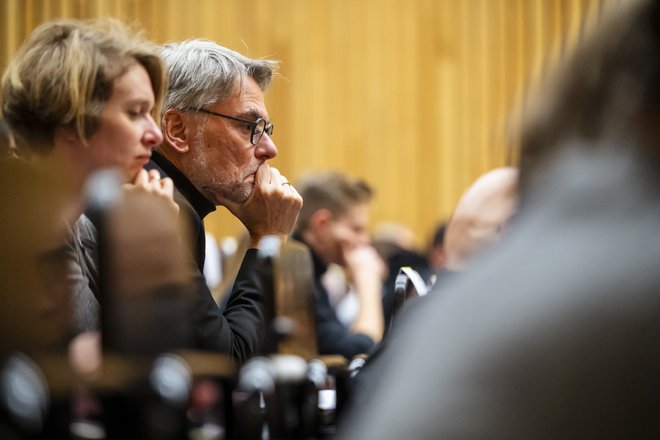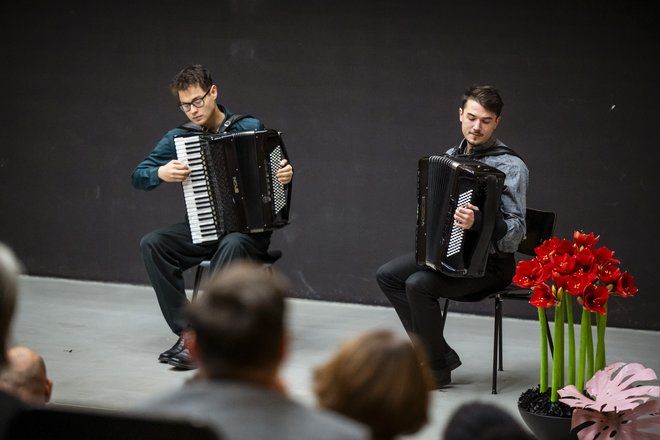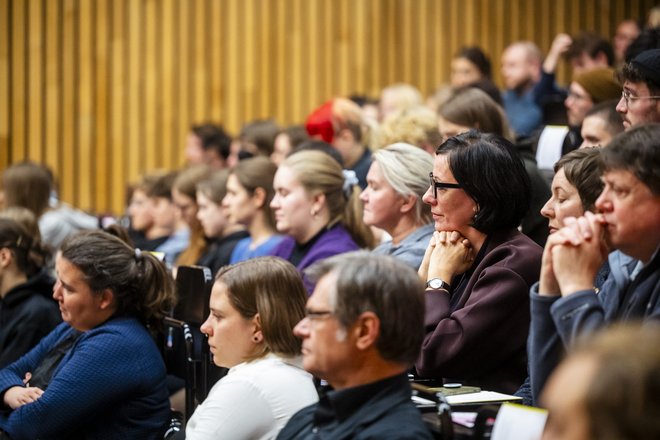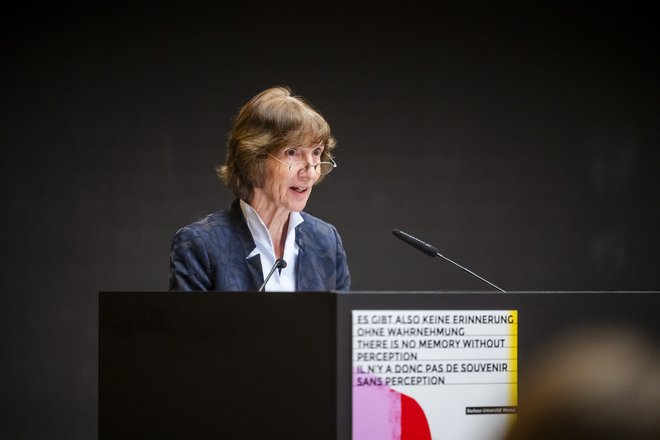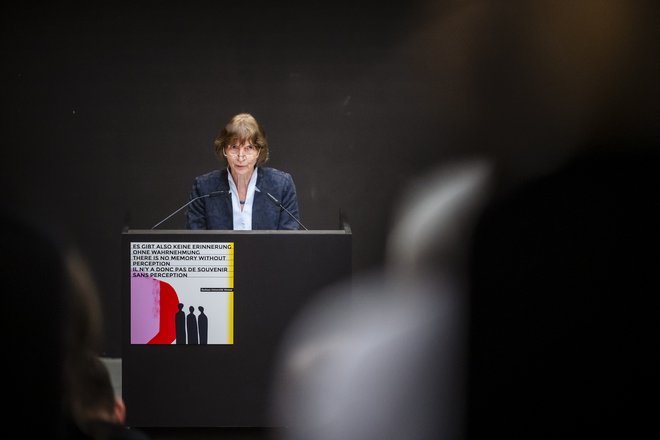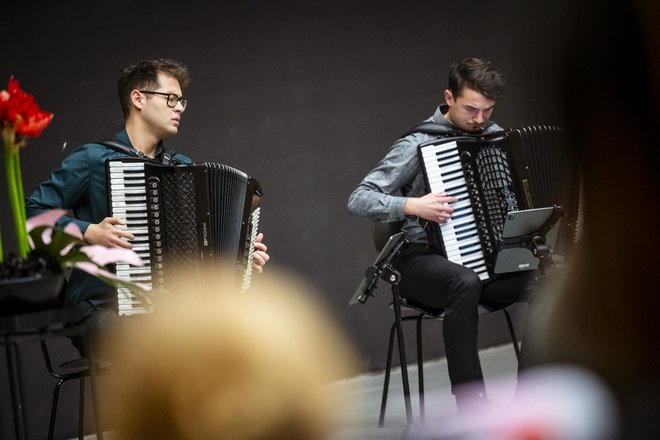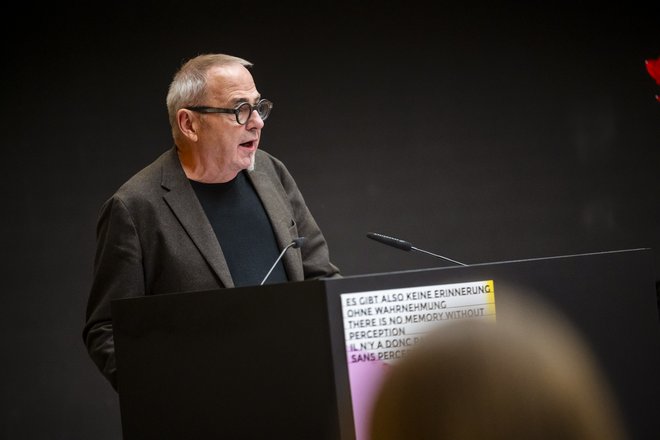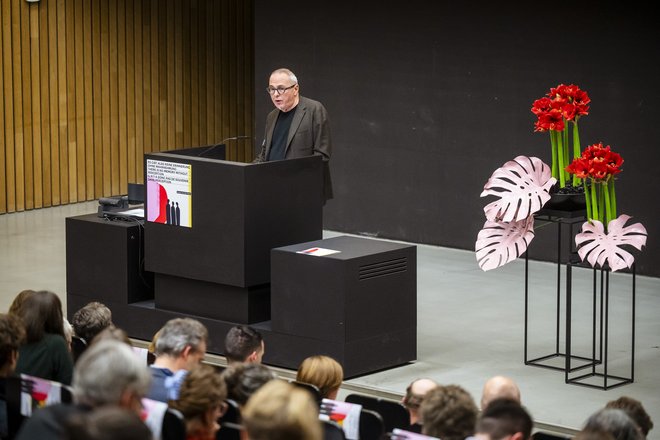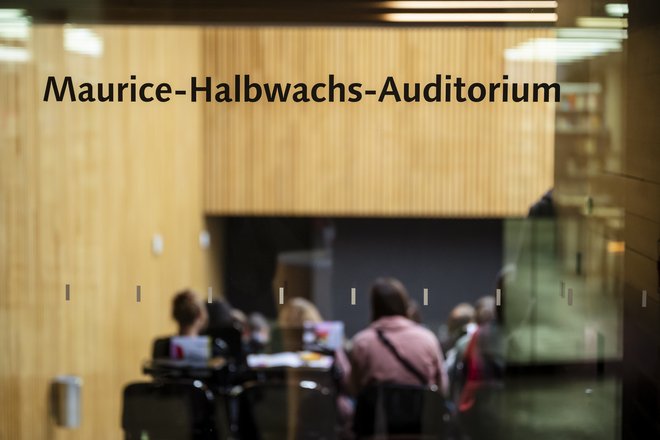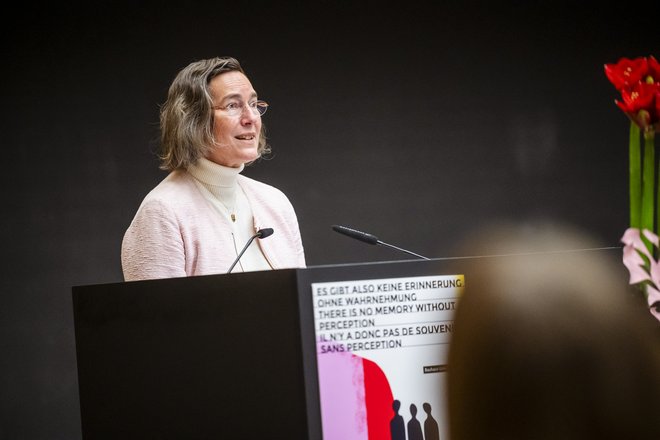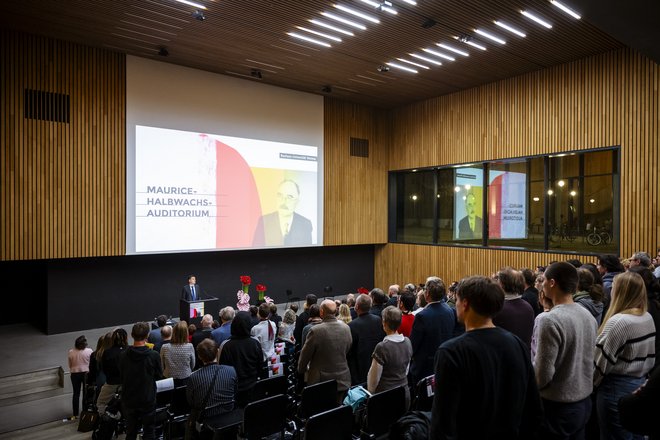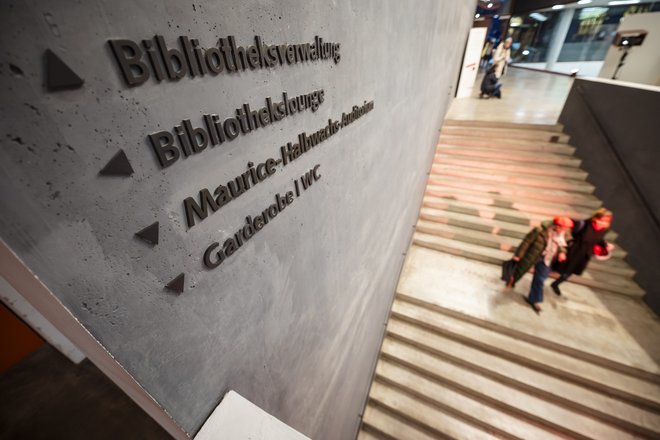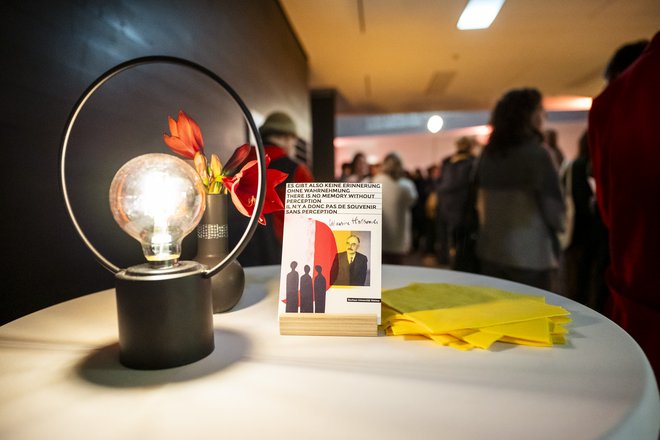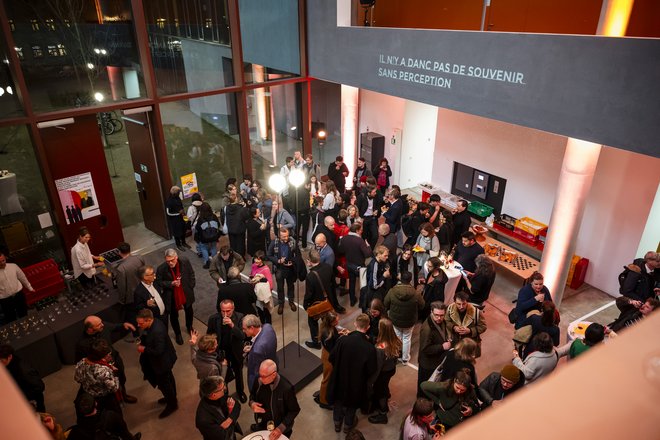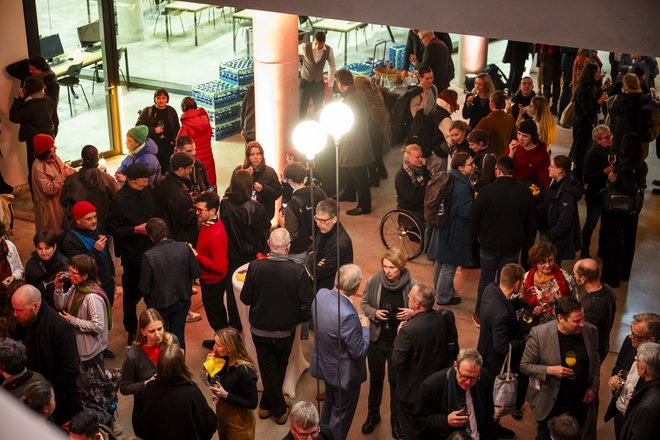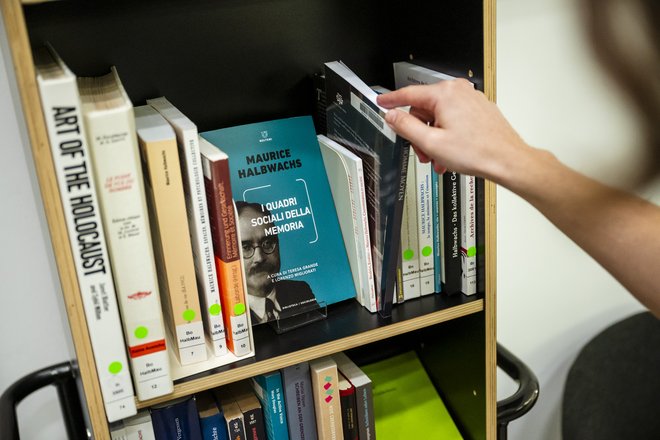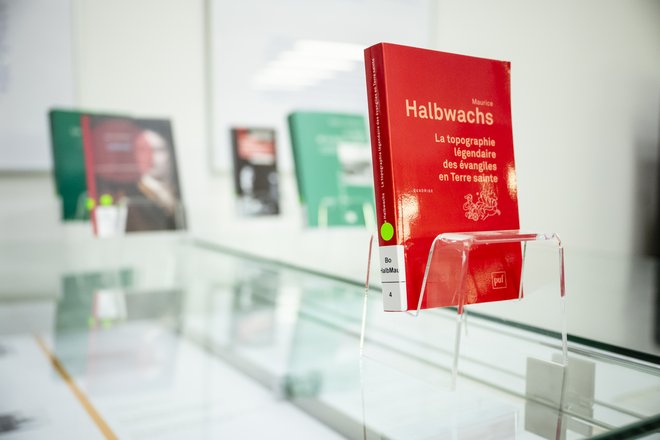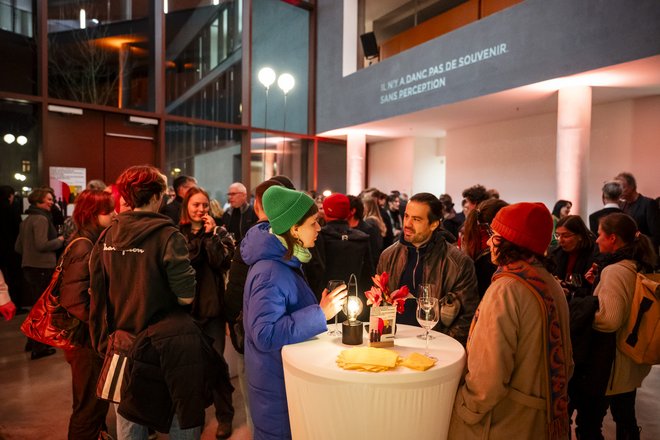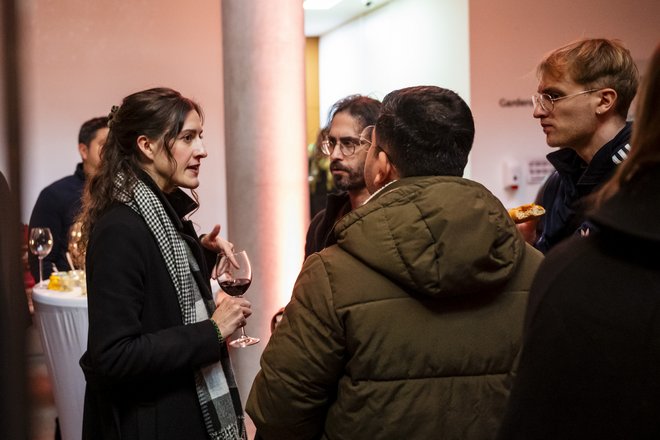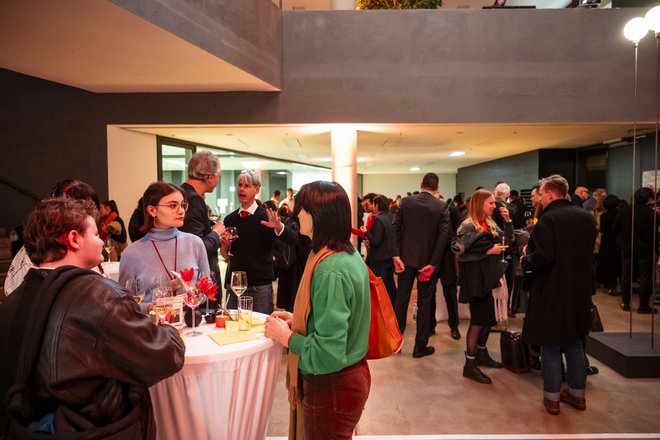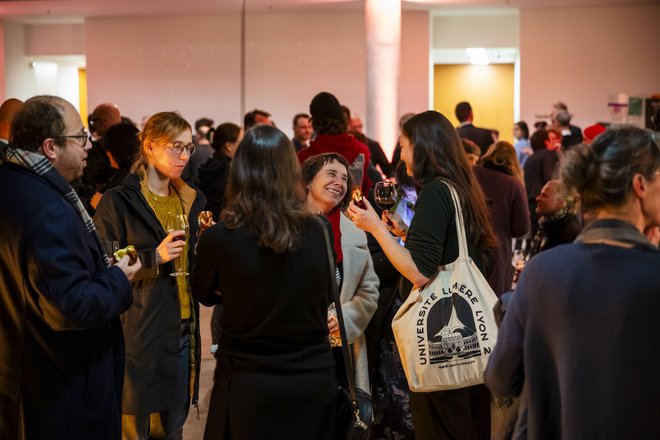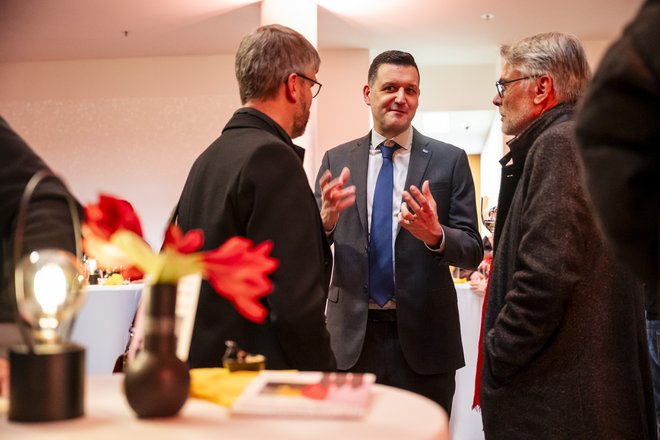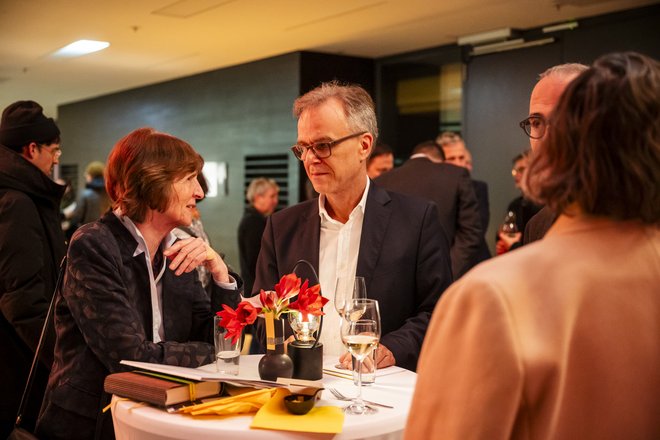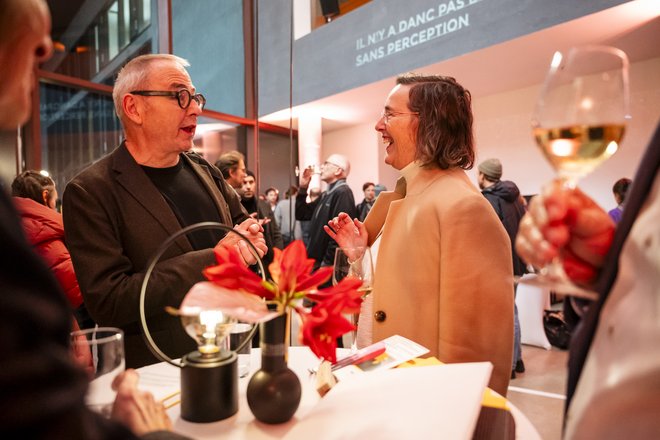- Official Instagram account of the Bauhaus-Universität Weimar
- Official LinkedIn account of the Bauhaus-Universität Weimar
- Official Vimeo channel of the Bauhaus-Universität Weimar
I honour of Maurice Halbwachs and on the occasion of the renaming of the Audimax to the »Maurice Halbwachs Auditorium«, we invited to a ceremony on Wednesday, 4 December 2024.
In addition to the photo gallery, you find the Key Speeches and the programme of the evening here.
Photos: Bauhaus-Universität Weimar/ Thomas Müller
Key Speeches
Prof. Dr. Aleida Assmann
Professor emerita for »Anglistik und Allgemeine Literaturwissenschaft«, University of Konstanz
Halbwachs: Between History and Memory (Translation)
When Jan Assmann and I began working on the concept of »cultural memory« in the 1970s and 80s, we were guided by an idea we had come across in the work of Dutch cultural historian Johan Huizinga: »History is the intellectual form in which a civilization renders account to itself of its past.«
At that time, we were more or less alone in our endeavours. On top of this, the concept of cultural memory was not one that aligned with the mindset of post-war West German society. The four decades directly following the war were marked by a »clean break« mentality that characterised the policies of Konrad Adenauer and Helmut Kohl. It was, in retrospect, a period of forgetting and silencing, as well as forgiveness and reconciliation.
An unspoken pack of silence existed in post-war society in West and East Germany, not only regarding the Nazi perpetrators, but also towards the victims of the Holocaust. Incidentally, the Allied powers supported the West German government in this attitude. In a speech given in Zurich in 1946, Winston Churchill emphasised: »If Europe is to be saved from infinite misery, and indeed from final doom, there must be this act of faith in the European family; and this act of oblivion against all the crimes and follies of the past.«
In both the West and the East, the »temporal regime of modernity« was the prevailing mindset at the time. [1] This meant that everything was expected from the future, while nothing was sought from the past. »From the ruins risen newly, to the future turned we stand« — these were the opening lyrics to the national anthem of the GDR. The future symbolised new beginnings, renewal, innovation, and progress. These political keywords were part of a culture of modernisation that, in the West, was based on emancipation and freedom, as well as rapid technological and economic growth. On both sides, the unwavering belief in the promises and potential of an inexhaustible future went hand in hand with a break from traditions and the past. It’s no surprise, therefore, that the concept of »cultural memory« was initially met with incomprehension.
Those who find themselves alone with their ideas understandably search through history for possible allies and kindred spirits. A significant portion of our early research into an expanded concept of memory was dedicated to investigating its genealogy. We sought and quickly found what we were looking for in the history of the late 19th and early 20th centuries.
Ernest Renan, Friedrich Nietzsche and Maurice Halbwachs: Pioneers of Collective Memory
We learned from Benedict Anderson that nations should not be understood as natural entities, but rather as »imagined communities« that can be altered. The power and influence of nation-states lie not only in their political systems, economic organisations, and administrative structures, but also in the common emotional content that their inhabitants share. In 1882, a century before Benedict Anderson, the French orientalist and cultural theorist Ernest Renan published his now-classic essay »What is a Nation?« .[2] Renan was the first to explore the role of collective memory in the process of nation-building. Renan spoke, using the language of the 19th century, of the »soul« of the nation — a concept we would translate today as »identity« or »self-image of society« . Collective identity and its associated self-image are, according to Renan, reinforced by shared memory: A nation »is the possession in common of a rich legacy of memories«. He adds: »However, the essence of a nation is that all of its individual members have a great deal in common and also that they have forgotten many things.«[3]
In his writing, Renan was referring specifically to the French nation, ten years after it was defeated by Germany in the Franco-Prussian War. He was well aware of the emotional stakes involved when he remarked: »[S]hared suffering unites more than does joy.« He followed this by stating: »Forgetting... is an essential factor in the creation of a nation and it is for this reason that the progress of historical studies often poses a threat to nationality. « The historian Eric Hobsbawn honed this idea further when he wrote: »As Ernest Renan said a century ago: ›Getting history wrong is an essential part of being a nation.‹ «[4]
Renan had therefore provided an outline for the intricate subject of national memory, portraying it as a force that strengthens group identity, is shaped by emotions, and operates selectively. In the margins of his arguments, the enduring conflict emerges — a conflict that we continue to grapple with today — between memory construction and historical research.
At the same time, Friedrich Nietzsche was engaged in fundamental reflections on the construction and impact of collective memory. Writing after the Franco-Prussian War, in this case from the victorious side, he interpreted Germany's military victory as a cultural defeat. In his reflections on national memory, Nietzsche, like Renan, wrote against an enemy. This opponent, however, was not France but rather historicism, or, more precisely, the historical sciences flourishing at universities in the 19th century. Nietzsche, himself a professor of classical philology in Basel, was part of the transition toward a modern knowledge society characterized by increasingly specialized disciplines. And still the unchecked proliferation of knowledge concerned him. He feared that indistinct mass of positivist knowledge being generated by the historical sciences would erode the precious educational framework that supported individual or group identity and provided them with purpose, meaning, relevance, and orientation.
Like Renan, who had identified historians as a hindrance to the construction of national memory, Nietzsche defined collective memory in opposition to academic historical research, which he believed was designed to dismantle the essential commitments and convictions of a collective. For Nietzsche, »[h]istorical knowledge streams out of invincible sources always renewing itself with more. Strange and disconnected things push forward. Memory opens all its gates (...) [A]ll the border markings have been ripped up, and everything that used to exist has come crashing down onto people.«[5]
A memory that opens all its gates is no longer a memory. While archive of scientific knowledge is not unlimited either, there are two critical factors that differentiate it from the functional memory of the nation: the archive offers much more room for all manner of information and, more importantly, its limits are constantly shifting in response to new questions and tasks, theories and perspectives. Collective memory, on the other hand, is completely different: it is guided by gatekeepers who distinguish between the relevant and irrelevant, the vital and trivial, and—above all—the identity-related and non-identity-related. Without a »we«, without a concept of identity and a position in history, without distinction and perspective — Nietzsche spoke of »character« and the »formation of horizons« — there can be an endless increase in »knowledge«, at the same time that there is no »memory«.
Nietzsche’s antidote to this cultural expansion of knowledge was the educated individual who does not allow themselves to be overwhelmed by knowledge and instead learns to limit it, using it in the service of life. This ability to contain the flood of knowledge for oneself and to establish a life-serving horizon of understanding was, in Nietzsche's view, the pinnacle of education.
Maurice Halbwachs and the Concept of Social Frameworks
The third figure in our ancestral gallery of memory is Maurice Halbwachs. Along with other outstanding thinkers and artists such as Freud and Proust, Halbwachs devoted himself to the dynamics of memory in the 1920s. He did this not in the context of a theory of the individual psyche, but through a theory of society. An empirical sociologist, Halbwachs was not interested in the isolated individual and their inner life, but rather in the social relationships through which remembering and forgetting occur. Society and its framework of memory, Halbwachs clearly explained, profoundly influence the individual. I quote: »No memory is possible outside the frameworks used by people living in society to determine and retrieve their recollections.« Unlike Renan and Nietzsche, he did not think from the top down, but rather from the bottom up. Halbwachs concluded that a completely isolated individual could not form memories, as memory itself only develops with the establishment of social relationships. This implies that not only are we never completely alone with our memories, but also that we rely on others to support or confirm our memories. According to Halbwachs, remembering is an essential form of social communication. Exchanging memories creates relationship networks between groups who share a repository of knowledge and experiences.
Halbwachs expanded upon these insights with his concept of the »social framework«. The social framework is the threshold between remembering and forgetting. Much like a picture frame, the social framework includes some things while also excluding a great many others. However, social frameworks are not static; they shift and require constant reaffirmation or renegotiation.
National memory tends to follow a simple logic of forgetting, which is evident in monuments and symbols in public spaces. In Paris, for instance, you can find metro stations named after Napoleon’s victories, such as »Iena« or »Austerlitz«. It would be unfathomable, however, to find a metro station in Paris named »Waterloo«. On the other hand, this is the name of a station where you can board in London. In other words, a nation’s memory commemorates its victories and ›forgets‹ its defeats, even if these are documented in history books.
These questions are deeply intertwined with emotions, which serve as the foundation and fuel of memory. While pride, the desire for recognition, and a positive self-identity determine what is remembered, emotions like guilt and shame are responsible for the exclusion and suppression of certain memories. Nietzsche was well aware of this and summarised it concisely in the aphorism:
I have done that, says my memory.
I cannot have done that—says my pride and remains unshakeable.
Finally—memory yields.[6]
For a long time, national memory was restricted to a glorious, honourable, or, at the very least, acceptable segment of the past. Faced with a guilt-laden or traumatic past, national memory typically allowed only three sanctioned positions in its narrative: that of the victor, who overcame evil; the resistor an martyr, who fought against evil; and the victim, who passively endured evil. Anything beyond these positions and perspectives could hardly, if at all, become the subject of an accepted narrative and was therefore officially »forgotten«. Peter Novick writes that »collective memory simplifies; sees events from a single, committed perspective; is impatient with ambiguities of any kind; reduces events to mythic archetypes.« (Novick 1999, 4)
The significance of social and political frameworks in shaping collective memory cannot be overestimated. As long as these frameworks remain uncontested, they go unnoticed and support the internalised norms and values of the group. However, historical constellations can change, as we observed after 1990. At that time, there were clear indications that the narrative of national memory could also change, moving towards Johan Huizinga’s adage: »History is the intellectual form in which a civilization renders account to itself of its past.«
Historical Research and Memory Culture
Polish philosopher Leszek Kolakowski articulated this even more clearly, saying: »We learn about the past to know how to recognise around us those faces touched by its worst legacy.«
This poignant sentence returns to me on today’s commemoration and celebration at the Bauhaus-Universität Weimar. We are learning the story of Maurice Halbwachs, an influential scholar of the 20st century, who was also a great European and an expert on German culture and language. In July 1944, he was arrested in Nazi-occupied Paris and deported with one of his sons to Weimar and Buchenwald. For Buchenwald cannot be reached without first passing through Weimar. This was eight months before the end of the war. Halbwachs died in the Little Camp at Buchenwald, just four weeks before the war ended, succumbing to the effects of his imprisonment. A final gift from Halbwachs is given to us by writer Jorge Semprún, who encountered Halbwachs in the Little Camp and witnessed his last days and hours. Semprún’s words continue to act as a precious legacy for future generations.
Weimar and Buchenwald – we always try to keep the two places distinct from one another. But with Halbwachs, this is impossible. He first came to Buchenwald, and now he has come to Weimar. In doing so, he challenges the logic of clearly separated places and their respective »frameworks of memory«. I wish to thank Frank Eckardt for his meticulous, long-standing research on Halbwachs, which has provided the foundation for today’s remembrance initiative. Historical research and remembrance are mutually dependent, but are not the same. Historical research contributes to general knowledge, but doesn’t necessarily contribute to learning from history. That is the responsibility of remembrance: to tell and interpret history so that it reaches audiences in the present day, allowing them to embrace it and include it in their own histories.
There are a few important distinctions to make between historical research and the culture of memory, which I will briefly summarise: Historical research may attract the interest of the public, but it doesn’t have to; it develops in the protected sphere of academia as a dialogue between scholars. The culture of memory, in contrast, is a broad term that encompasses many dimensions. This includes state mandates, rituals, and scientific, literary, and artistic contributions to culture. Its domain is the public sphere together with its media, but it also relies on schools, education, political awareness, and —crucially — independent local civil society initiatives.
The term »remembrance« should never, though it often is, be reduced to individual personal experience. Historical research can only begin its work once history is completed— that is to say, in the past. From the perspective of memory, however, the past is not yet complete; it remains open to the present and the future. This is precisely what we are experiencing today: the history of Maurice Halbwachs, concluded in Buchenwald, has reached us in Weimar right now while simultaneously opening up a new future. He has been brought from Buchenwald to Weimar in the university's largest public auditorium. This means: his story is not over; it has become a universally accessible memory. Each student who sits in this auditorium is participating in this history, connecting it to the future and including everyone who will ever teach or learn in this room.
[1] Ist die Zeit aus den Fugen? Aufstieg und Fall des Zeitregimes der Moderne. Munich: Hanser, 2013.
[2] Was ist eine Nation? und andere politische Schriften, Wien, Bozen 1995, S. 57. Engl. translation: »What is a Nation«, in Nationalism in Europe from 1815 to the Present: A Reader. Ed. Stuart Woolf. London: Routledge, 1996.
[3] Renan, 56.
[4] Eric Hobsbawm, On History. New York: New York Press, 1997: 270.
[5] Friedrich Nietzsche, 231.
[6] Nietzsche, Friedrich. Beyond Good and Evil 1886 Aphorism 68.
Translation: Kathryn Arsenault
Prof. Dr. Bertrand Müller
Research Director, Centre Maurice Halbwachs
Maurice Halbwachs, Beyond Weimar (Translation)
On 23 July 1944, Maurice Halbwachs, aged 67, was arrested in Paris by the Gestapo. He was charged with having protected his son Pierre, who had been arrested just a few days before for his involvement with the Resistance. A few months earlier, Halbwachs’ father-in-law, Victor Basch, President of the International League for Human Rights, and his wife had been brutally murdered by the French militia.
The deportation to Buchenwald would prove to be both long and humiliating. In the camp, Halbwachs, like many others, was subjected to forced labour from dawn to dusk. Despite being regularly beaten and poorly fed, he survived for several months. After being hospitalized once in August and recovering, he succumbed during a second hospitalization to cachexia and dysentery after three weeks. He died of exhaustion on 16 March 1945.
For Wolf Lepenies, Maurice Halbwach will be remembered as both a participant in and a victim of the armed conflicts between France and Germany, conflicts that are now part of the past. Halbwachs' death, as someone who was not a fighter, reminds us that wars are not only manifestations of military force but, as Wolf Lepenies emphasizes, echoing Halbwachs' contemporary, philosopher Julien Benda, also »cultural wars«.
With the resurgence of dubious claims about »clashes of civilizations«, »decivilization«, and the rise of oppressive and authoritarian democracies, the intellectual and political commitment of Maurice Halbwachs merits renewed attention.
Maurice Halbwachs’ life spanned the most recent conflicts between France and Germany: namely the Franco-Prussian War of 1870. He was born in Reims in 1877, but his father was originally from Alsace and was a German teacher who had opted for French nationality in 1871.
And then the two world wars: 1914-1918 and 1939-1945.
From birth, Halbwachs was immersed in German language and culture. After earning a degree in philosophy in 1901, he spent quite a lot of time in Germany and Austria.
A convert to sociology, his work was enriched by reading German economists, sociologists, and philosophers. Halbwachs quickly became a bridge between the two cultures while remaining wholly French. His patriotism did not, however, detract from his internationalist and European convictions, and he maintained close ties with Germany and its intellectual circles throughout his life.
It is not my wish here to paint a portrait of a great French intellectual, but rather to focus on Maurice Halbwachs’ relationship with German language and culture: What he learned from Germany, what he unlearned during the First World War, how he invested in Franco-German reconciliation up until the National Socialist rupture, and how, until the very end—even to the point of delusion—he maintained his attachment to a German vision of science and culture.
Learning from Germany
What did Maurice Halbwachs learn from Germany? Two key things: The study of social classes, in particular the working class, inspired by the German economists; and the methodology of German statisticians, whose statistical practices were more advanced than those in France, and they provided reliable data for the development of an empirical and rational sociology.
In 1903–1904, Halbwachs went to Göttingen as a French language instructor to conduct philosophical research on Leibniz, which was of interest to Henri Bergson, Halbwachs’ philosophy professor at Lycée Henri IV and the École normale supérieure. While involved in a project to edit Leibniz’s complete works—which ultimately did not materialize—Halbwachs encountered ideas that shaped his philosophy of knowledge. Rejecting Leibniz's metaphysics and theology, he was drawn to his nominalist approach and appreciation for scientific and human experience. The inventor of infinitesimal calculus taught Halbwachs to free himself from rigid historical materialism, modernize his socialist convictions, understand society as a creator of collective and individual memories, enrich his rationalist philosophy, and strengthen his European perspective. Halbwachs dedicated this first volume to him, giving it the simple title of »Leibniz«. Published in 1907, Halbwachs later revised the text and republished an expanded version in 1928.
In Göttingen, Halbwachs also explored German socialism at a time when it was splitting into two opposing factions: Marxism and social democracy. He was not a Marxist himself, but aligned with Bernstein's revisionist positions, dedicating two major articles to him in the »Revue philosophique« in 1905. These articles were pivotal for shaping his research on social classes and his perspective of science and activism. He also engaged with the works of German economists such as Werner Sombart, Gustav Schmoller, and Karl Bücher, whose ideas he helped to introduce in France, primarily through Émile Durkheim’s journal, »L’Année sociologique«, where Halbwachs became a close and loyal collaborator.
During a later stay in Berlin in 1909, Halbwachs familiarized himself with the German university system by attending Gustav Schmoller’s lectures. Seeking to learn from German statisticians, he met Heinrich Silbergeist and Johannes Feig at the Imperial Statistical Office. The two helped him understand the city's administrative structures, valuable for his research on urban sociology and the working class.
Halbwachs did not come to Germany as just a scholar; he was also a socialist activist, joining the SFIO (French Section of the Workers’ International) in 1906. He was interested in Marxism, met with socialist activists, and wrote articles on the German labour movement for »L’Humanité«, a newspaper founded and directed by Jean Jaurès. After writing an article on the suppression of a workers' strike, Halbwachs was expelled from Germany. He then moved to Vienna for the final months of his mission, where he engaged with economists who represented a more theoretical and abstract school of thought, in contrast to the historicist Berlin school.
Following his stays in Paris, Halbwachs turned his attention to the sociology of working-class consumption, which he approached with a distinctly statistical focus to define the working class. In 1909, he defended his law thesis titled »Les expropriations et le prix des terrains à Paris (1860-1900)«. Then in 1913, he defended his thesis »La classe ouvrière et les niveaux de vie. Recherches sur la hiérarchie des besoins dans les sociétés industrielles contemporaines«, the first thesis on the first thesis on the working class. This ethnographic study of workers’ daily lives was enriched by a fresh analysis of household budgets. Finally, in line with the French academic model, he defended a complementary thesis, »La théorie de l’homme moyen. Essais sur Quételet et la statistique morale«.
Unlearning from Germany
When war broke out in August 1914, and especially in the wake of the assassination of Jaurès, Halbwachs found himself in a painful dilemma. Although a pacifist, he ultimately rallied to the Sacred Union but remained an internationalist and refused to renounce his admirations. He wrote to his wife: »I owe too much to German thought, I have too much intellectual sympathy for them. I instinctively side with those who knew (or know?) how to remain free from narrow and brutal chauvinism, to remain citizens of the world, especially today.«
He recognized, however, that the moment did not lend itself to being what he referred to as »pro Germania«, particularly after he had learned of the warmongering declaration of the 93 German scientists and artists, who were engaging in a cultural war in the name of Goethe, Kant and Beethoven. Halbwachs remarked: I have always thought that in the event of war human nature becomes deeply distorted; I regret that our qualities and faults do not develop more fully by blending with one another.«
A staunch Germanophile who had learned so much from Germany, Halbwachs was now forced to »unlearn« from Germany, in the words of Belgian historian Henri Pirenne, another passionate advocate of Germanic culture and science.
Refusing to surrender to aggressive nationalism, he based his hopes on the fact that this war would be the last, that it was »directed against war« and that it would put an end to militarism by giving the people control over their future. However, his optimism was often shaken by moments of despair. Exempted from military service due to vision problems, he regretted not having »been at the front«. Like others, he was initially fascinated by the notion of sacrifice, the risk of death, and the test of courage—a »physical and precarious life, akin to a return to uncivilized forms where human nature is rejuvenated and reasserted«.
While idealising a more dramatic, brutal and savage reality, Halbwachs approached the war as both a sociologist and a socialist activist. He saw the war as a »full-scale sociological and political laboratory«, which he sought to understand and analyse using all available sources: letters, objects, and especially photographs.
Like historian Marc Bloch, who was mobilised at the front, Halbwachs distrusted propaganda, the reliability of testimonies, and false news. The discovery of atrocities at the front, which were not mere propaganda but grim realities, shook his optimism but did not undermine his »Germanophilia« or his convictions in the virtues and necessity of intelligence and the universality of science. As a socialist activist, Halbwachs remained committed to spreading the spirit of socialism to prevent the »national defence movement« from being co-opted. He believed the war would result in a more just and fraternal world, a »democracy reformed and purified by war«.
In 1916, he joined the ministerial office of his socialist friend Albert Thomas, Minister for Armaments. According to historian Annette Becker, Halbwachs remained a staunch socialist during the war, even as his sister embraced militant pacifism.
Halbwachs remained vigilant against the excesses of the German socialists, denouncing their »abject dealings to impose an armistice or a botched peace«.
His negative opinion of Russia softened slightly after the February Revolution, though he remained sceptical: »An astonishing experiment by a great nation without a government. [...] Nothing good will come of this anarchy for us, but also nothing outright bad.« »In truth, their revolution lacks true grandeur; there is no altruistic concern for the salvation of the nation or for the future of democracy«, although Halbwachs did acknowledge that the Bolshevik revolution would definitively transform the future.
When Halbwachs returned to Nancy after Albert Thomas’s resignation, he became acutely aware of the repression and humiliation that the German occupation had imposed over the past thirty years.
Relearning Germany
Appointed to a chair of sociology in Strasbourg in 1919 (the second in France, after Émile Durkheim’s), Halbwachs joined a team of professors who shared a spirit of renewal, collaboration, and, notably, Franco-German reconciliation.
Strasbourg had played a central role in the »cultural war« between France and Germany.
In 1870, the Bismarck Reich had built a new university there as a symbol of its scientific and intellectual supremacy. In 1919, victorious France sought to reclaim it, equipping the university with exceptional resources to achieve this goal.
Halbwachs succeeded Georg Simmel, who had been removed from Berlin in 1914 for refusing to engage in Pan-German propaganda. At the University of Strasbourg, German language and culture retained their importance in this new cultural climate. Halbwachs welcomed his German colleagues and even taught in Mainz at a French institution.
The 1925 Locarno Agreements ushered in a period of reconciliation following the years of tension (as described by American historian Robert Paxton), allowing intellectual exchanges to flourish again. In 1928, Halbwachs and his psychologist colleague Charles Blondel participated in the Davos courses organised by Gottfried Salomon to promote intellectual reconciliation.
Resuming his role as intermediary between the two countries, Halbwachs focussed on publishing in France rather than Germany, where he published a single article in the »Jahrbuch für Soziologie« in 1926 on social classes. In this article, he reviewed the report on his thesis written by the Austrian finance minister Robert Meyer. The report recognised Halbwachs’ work as a genuine scientific exploitation of the data.
Halbwachs focused mainly on German economics and economic sociology, reviewing more than 58 German works for various French journals, though this was modest compared to Émile Durkheim, who had reviewed over 200. Halbwachs was just as interested in English works (52 titles).
He was especially interested in one »very German German«, whom he had never met: Max Weber. Halbwachs became the leading French commentator on Weber’s work, which Durkheim had, curiously, entirely ignored.
In 1924, in »l’Année sociologique«, Halbwachs reviewed the seminal »Grundriss der Sozialökonomik«, which had been written before the war under the direction of Max Weber. He paid most attention to the 3rd section, which was written by Weber. Halbwachs was intrigued by the »ideal-typical« method of the German economist, who »tirelessly divides, subdivides, and combines the categories he has distinguished« to create a »conceptual equivalent«, the ideal type. And even if this »taxonomic method«, applied with virtuosity, sometimes risks exceeding its purpose, he acknowledges that »behind this somewhat uncertain approach, one can at least discern a fairly accurate sense of the shortcomings of traditional concepts«.
Referring also to his now famous analyses of »bureaucratisation«, Halbwachs questioned the economist perspective of Weber, which he judged to be too rationalist, despite Weber's efforts to place economic facts in the context of social life.
In 1925, Halbwachs he provided a lengthy summary for »la Revue philosophique« of the theses »l’Ethique protestante et l’esprit du capitalisme«. He was the first to introduce these ideas to French readers, accompanied by studies from the theologian Ernst Troeltsch. Halbwachs rejected the positions of Werner Sombart and those of Lujo Brentano, which he considered to be »of little significance«.
That same year, in »L’Année sociologique«, he discussed »Gesammelte Aufsätze zur Sozial- und Wirtschaftsgeschichte« as well as »Wirtschaftsgeschichte«, and opposed Sombart while supporting Weber’s theses on the Puritan origins of capitalism.
In 1929, he chose another publication, a historical one this time, to present an extensive account of Weber’s life and work, based on the biography written by Weber’s wife. This journal, of which he became an important contributor, was »Annales d’histoire économique et sociale«, founded in Strasbourg by historians Lucien Febvre and Marc Bloch, with whom he maintained an important intellectual friendship that began with their arrival in Strasbourg.
Halbwachs was fascinated by Weber's personality and his immense capacity for adaptation, always »putting his ideas to the test«: »Each time he completed a project, he seemed to find a new reason to go even further.«
»Weber was not a desk-bound sociologist. You could say that wherever he saw people gathered around a work or an idea, he went and joined them.« Halbwachs also endeavoured to be an urban sociologist, enriching his work through visits and photographic reports.
Clearly, his interest in German sociology was selective. Apart from Weber, whom he admired, and Sombart, whom he criticized, he also took note of Karl Mannheim, Georg Simmel—who he referred to as »a talented sociologist« —and philosopher Ernst Cassirer.
However, he disapproved of German sociology’s attachment to theory and indifference to reality, its hostility to empiricism, and its enthusiasm for grand sociological systems, exalted metaphysical flights, and affected spiritualism.
Halbwachs also read the classics in full and often in first editions, which were sometimes recommended to him by his father-in-law Victor Basch: Fichte, Goethe, Herder, but also Schopenhauer’s »Le Monde comme volonté«. Though he considered the philosopher Nietzsche somewhat old fashioned, he read his »Human, All Too Human« and, during the war, »Was ist Deutsch?« as well as Hegel’s »Phenomenology of Spirit«.
Fighting Fascism. Backlash Against Democracy.
But what is German sociology? Halbwachs did not agree with Raymond Aron's assessment that both French and German sociologies »express, each in its own way, the ›national soul‹«, an idea that clashes »with the beliefs of those who see sociology as a science and not a philosophy«.
Conversely, German sociologists dismissed French sociology for its rationalism and, of course, its inability to grasp the »essence« of phenomena.
Starting in the 1930s, though, German sociology took a turn.
Many sociologists, including Sombart, applauded the coming to power of the Nazis, seeing it as an opportunity for »German sociology«, which, with the notions of »community« and »people«, would be able to free itself from the influence of »foreign« forms of sociology, and which, thanks also to the many institutes created by the Nazis, would offer a greater number of esteemed positions.
In his analysis of Sombart’s »Deutscher Sozialismus«, Halbwachs noted this »curious transformation of an economist who, as we know, once lyrically celebrated capitalism and the vibrant life of modern societies, but now preaches a return to ›the good old days‹«.
From that point on, German sociology of the era, represented by figures like Hans Freyer and Helmut Schelsky, was defined by teaching »social knowledge and analysis of the present to understand the new reality realised through the ›national-socialist revolution‹«. Maurice Halbwachs quickly realised that this kind of sociology defined itself by simply inverting the traits of its adversaries: Francophiles, Jews, progressives, democrats, rationalists, socialists, cosmopolitans... Franz Böhm, one of the sociologists who supported this ›German sociology‹, said that »German sociology will not be all that, but strictly its opposite«.
Alongside fascism in Italy, National Socialism in Germany radically reshaped the landscape: the cultural battle became a war against democracy and the Enlightenment. The intellectuals of the pre-1914 cultural fight for freedom—Freud, Proust, Bergson, Thomas Mann, Stefan Zweig—who inspired the author of »On Collective Memory«, had been replaced by professional propagandists, totalitarian spokespeople in Russia, Italy, and now Germany.
The Durkheimians could not have foreseen how the temptations of totalitarianism would threaten modern societies with a return to barbarism.
After Hitler’s rise to power in 1933, Halbwachs acted as an interlocutor, a recourse and sometimes a help for many German sociologists persecuted by Nazism: among others members of the Frankfurt School, as well as Adorno, Max Horkheimer, Gottfried Salomon, Paul Honigsheim, Norbert Elias, Karl Manheim, Alfred Schutz, the list goes on...
Halbwachs, who wrote extensively on demography, migration, and foreigners, rejected the mystique of blood and soil; he could not accept the idea of »the German people united behind Nazi leaders« in »a community of faith and combat united in spirit and will«.
In 1933, he published a short article on the Jewish population in Germany. In 1937, he dedicated three pages in the »Annales« to the finances of National Socialism, and in 1939, he wrote about about hygiene policies and the totalitarian state. In a 1940 article, he noted with a certain irony that »the history of proselytism also explains paradoxical phenomena, namely that Berlin Jews, based on blood tests, are purer Europeans than the Germans themselves«.
In 1939, he published »La mémoire collective chez les musiciens«. A follow-up to his major 1925 work »On Collective Memory«, the publication responded to the ideological uses of Wagner by the Nazis and explored the role of mass media in totalitarian propaganda, from Italian fascism through Nazism to Stalinism, in the form of radio and film propaganda.
Halbwachs joined the Watchfulness Committee of Antifascist Intellectuals in Paris after the far-right demonstrations of February 1934. While not an active militant, he remained a vigilant and deeply concerned observer. In 1938, following the Czechoslovakian crisis, he wrote: »This is a warning, both for other nations and for ourselves. Let us hope that people understand that a world war would ultimately benefit neither of them.«
During the war, Halbwachs was not an active fighter with the Resistance, but joined the »réseau d’information Thermopyles«, set up by former students of the École Normale Supérieure. According to one of its organizers, René Zazzo, Halbwachs »had all the intellectual and moral qualities of a resistor; he was a patriot in words and deeds, but clearly lacked the skills necessary for clandestine activity—disguises, deception, cunning«.
Conclusion
Halbwachs was arrested in Paris on 23 July, shortly after being appointed to the Collège de France, while helping his Jewish wife evade the police. At Buchenwald, he became involved in the camp's intellectual life, giving lectures on Marx and the falling birth rate in Germany, about which he knew a great deal.
I believe that today, we ought to resist the ritualistic temptation of commemoration and the »duty to remember«. Annette Becker has noted the absence of war in the sociology of memory, but this absence is also understandable given that Halbwachs’ concept of collective memory differs from the notion that has dominated since the 1990s, marked by the »duty to remember« and identity fantasies.
Pierre Bourdieu, in a moving tribute, urged us not to celebrate Halbwachs among the vanished heroes, as that would erase him a second time by accepting his disappearance:
»We must pick up the fight where he left it, without forgetting the violence that defeated him, and which we must try to understand.« (Pierre Bourdieu)
This struggle lies in the questions Halbwachs raised about social classes, collective memory, and religious representations. Today, these questions challenge us once again in different terms and in a new social and political context: the erosion of democracy and the collapse of the social frameworks that define societies. These frameworks continue to unravel and decay; collective memory is reduced to alienated expressions of identity and social communication is subjected to the sordid manipulations of social media, and religious thought is abandoned to the worst fanaticisms.
During all this backlash to democracy, Halbwachs was a sociologist. Today, we can read him as a perceptive whistleblower.
Thank you for your attention.
Weimar, 4 December 2024
Translation: Kathryn Arsenault
Programme
Film
Leon Richter and Lukas Kretzschmar, RADICS
Welcome
Prof. Peter Benz, President of the Bauhaus-Universität Weimar
Welcoming Address
Peter Kleine, Mayor of the city of Weimar
Anne-Lise Bagrel, First Counsellor, Deputy French Ambassador to Germany
– Accordion duo con:trust: LA VALSE DES MONSTRES by Yann Tiersen –
Keynote Speech
Prof. Dr. Aleida Assmann, Professor emerita for »Anglistik und Allgemeine Literaturwissenschaft«, University of Konstanz
– Accordion duo con:trust: IN DER DUNKLEN NACHT by Thea von Heinleth –
Keynote Speech
Prof. Dr. Bertrand Müller, Research Director, Centre Maurice Halbwachs
– Accordion duo con:trust: ANANTANGO by Gorka Hermosa –
Greeting from the Halbwachs family
Franka Günther, Director of »Weimarer Rendez-vous mit der Geschichte«
Closing Address
Prof. Peter Benz, President of the Bauhaus-Universität Weimar
We warmly invite you to the reception after the event.
We wish to extend our gratitude to the »Institut français Thüringen« for their support.


